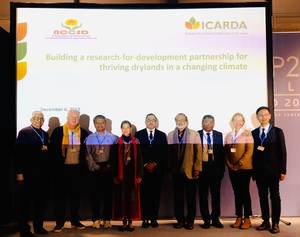| CCAFS’ Deissy Martínez Barón @ #COP25: I n order to #TransformFoodSystems we need to: reroute our farming practices + de-risk farming & value chains + reduce emissions through diets & value chains + realing policies, finance & innovation. |
2nd to the 13th of December. Madrid. Over 25,000 representatives from 200 countries converged in
the Climate Summit from the to reach agreements and commitments between nations to fight against the effects of climate change.
For more information about the conference, visit the COP25 official webiste.
During COP25, CCAFS co-hosted and participated in over 15 side-events and activities.
Extracts of the programme
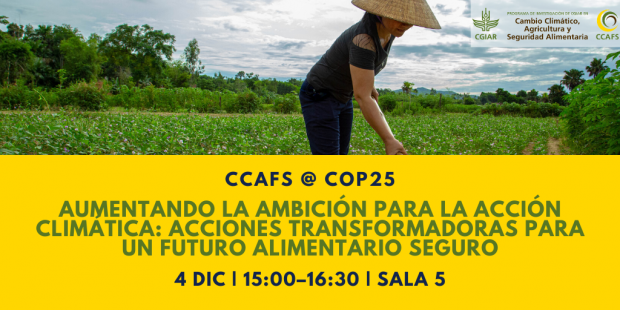 Organisers: FAO; Biovision Foundation for Ecological Development; CGIAR
Organisers: FAO; Biovision Foundation for Ecological Development; CGIAR
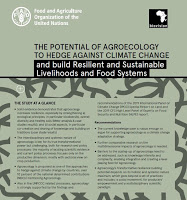
Speakers
To achieve the SDGs, we have to reach half a billion farmers. How can we do this in Sub-Saharan Africa? A pitch at #COP25 @FANRPAN event from @bcampbell_CGIAR begins w/ 1. markets for climate resilient practices, 2. cool jobs 4 youth, 3. advisories bundled with insurance.
If you missed the event you can view the webcast here.
This roundtable will addressed the UNCAS Call for Action on Adaptation and Resilience and The Nature-Based Solutions for Climate Manifesto and the implementation of the number of specific initiatives on food and agriculture. The purpose is to increase the ambition for climate action in agriculture and food value chains to deliver inclusive, resilient and sustainable systems. The discussion focused on the following 3 questions:
As a cross-cutting element, this Roundtable focused on how to engage marginalised groups including women, youth, indigenous people and people living with disabilities thereby achieve inclusion and equitable outcomes.
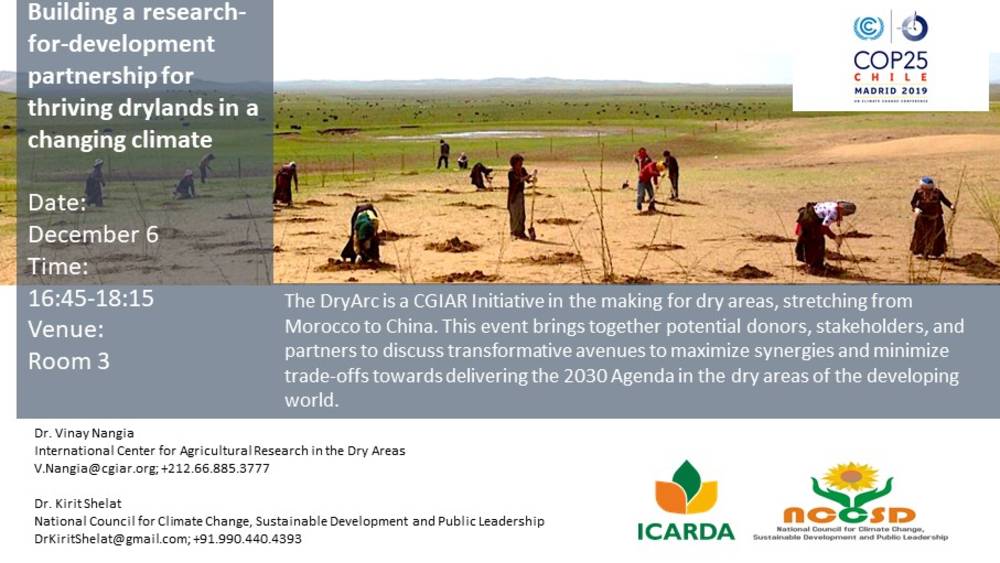
Organisers: The side event was led by ICARDA with the support of the Indian National Council for Climate Change Sustainable Development and Public Leadership (NCCSD) NCCSD.
presentation on behalf of CAAS Vice President Prof. Xurong Mei elaborating on the Chinese Government’s efforts in meeting the SDG goals and investing in dryland agriculture research. He informed audience that China has met the SDG goal on zero hunger and expects to meet the goal of zero poverty in coming years. He announced the plan for an international dryland agriculture conference in Beijing in October, 2020.
The EU Pavilion hosted a broad set of side events to stimulate debate on key thematic areas, engage observers and facilitate dialogue with party delegates and other participants.
 |
| An inaugural report on the State of Climate Services highlights progress, opportunities and challenges in rolling out climate services such as seasonal forecasts, drought advisories and fire danger indices. The report focuses on agriculture and food security, one of countries’ top climate change adaptation priorities and given that progress towards tackling global hunger has recently been reversed. |
The Global Climate Change Alliance Plus (GCCA+) is a European Union flagship initiative helping the world’s most vulnerable countries to address climate change.Since the GCCA was established in 2007 it focused on building climate resilience in Least Developed Countries (LDCs) and Small Island Developing States (SIDS). It expanded in 2015 to include middle-income countries and the new lens of Nationally Determined Contributions (NDCs). So far it has funded over 70 projects of national, regional and worldwide scope in Africa, Asia, the Caribbean and the Pacific.
More than ever the EU is expected to exert strong leadership on climate action. This event highlights key opportunities for the EU to enhance climate ambition through development cooperation.
On the sidelines of COP25, the 4 per 1000 Initiative “” organizes, with the support of the Spanish Ministry of Agriculture, Fisheries and Food, are organizing the 3rd “4 per 1000 Initiative Day”. This day, which is now annual and is being organized in conjunction with the UNFCCC COP, will bring together the 5th meeting of the Consortium of Members and the 4th meeting of the Forum of Partners.
At the event, Liesl Wiese-Rozanova, Soil Carbon Consultant with the CCAFS Flagship on Low Emissions Development, will present the findings from her study on soil organic carbon in the Nationally Determined Contributions (NDCs).
The international initiative “4 per 1000”, launched by France on 1 December 2015 at the COP 21, consists of federating all voluntary stakeholders of the public and private sectors (national governments, local and regional governments, companies, trade organisations, NGOs, research facilities, etc.) under the framework of the Lima-Paris Action Plan (LPAP). The Executive Secretariat of the “4 per 1000” initiative is hosted by the CGIAR System Organization, an international organization based in Montpellier.
Organisers: Secretariat of the Union for the Mediterranean; European Commission (Climate Action); Ministry of Agriculture; Rural Development and Environment of Cyprus
During this side-event the current state and risks related to climate and environmental change the Mediterranean will be discussed by scientists and decision-makers. An open and independent international network of Mediterranean Experts on Climate and environmental Change (MedECC) has been launched to gather, update and consolidate the best scientific knowledge on these issues and render it accessible to policy-makers and key stakeholders. The dialogue between scientists and decision-makers is facilitated by the Secretariat of the Union for the Mediterranean.
Complementary to this approach, the Cyprus Climate Change Initiative aims at the development of a Regional Action Plan to address the specific needs and challenges countries are facing in the Eastern Mediterranean and Middle East (EMME) region, to address and ameliorate the impact of climate change and advance mitigation actions in accordance with the Paris Agreement.
Speakers:
In Sub-Saharan Africa (SSA), smallholder farmers produce the majority of food but their food security is highly vulnerable to climate change. In this region, more than 650 million people work in the agricultural sector and will likely be affected by unfavorable cropping conditions. To enhance resilience against climate change perils, science-informed adaptation planning and capacity building for an effective and tailor-made NDC and NAP implementation is crucial.
However, this implementation is often limited because of unavailable information about climate change impacts and near-future weather risks. While capacity building has the potential to strengthen the local knowledge and enables informed long-term decision making, early warning systems can reduce short-term risks for investments in adaptation measures. Thus the combination of capacity building and early warning systems can support a successful implementation of adaptation measures in SSA.
Related: ECDPM BRIEFING NOTES (SERIES) – Boosting EU climate finance: Mitigate more without neglecting adaptation in poorer countries
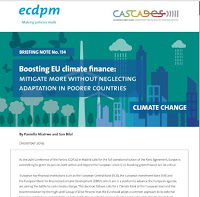 As the 25th Conference of the Parties (COP25) in Madrid calls for the full operationalisation of the Paris Agreement, Europe is committing to green its policies both within and beyond the European Union (EU). Boosting green finance will be critical.
As the 25th Conference of the Parties (COP25) in Madrid calls for the full operationalisation of the Paris Agreement, Europe is committing to green its policies both within and beyond the European Union (EU). Boosting green finance will be critical.
European top financial institutions such as the European Central Bank (ECB), the European Investment Bank (EIB) and the European Bank for Reconstruction and Development (EBRD), which are in a position to advance the European agenda, are joining the battle to curb climate change. This decision follows calls for a Climate Bank at the European level and the recommendation by the High-Level Group of Wise Persons that the EU should adopt a common approach to its external financial architecture and establish a single entity, the so-called European Climate and Sustainable Development Bank.
EU efforts to boost its climate action and finance should encompass not only the vital mitigation endeavour, but also greater attention to climate adaptation, as a means to foster climate justice and to achieve the SDGs also in low-income countries, and in Africa in particular. The new European Green Deal will have to live up to this challenge.
Source: PAEPARD FEED
by secretary
by secretary
by secretary
by secretary
by secretary
by secretary
by secretary
by secretary
by secretary
by secretary
by secretary
by secretary
by secretary
by secretary
by secretary
by secretary
by secretary
by secretary
by secretary
by secretary
by secretary
by secretary
by secretary
by secretary
by secretary
by secretary
by secretary
by secretary
by secretary
by secretary
by secretary
by secretary
by secretary
by secretary
by secretary
by secretary
by secretary
by secretary
by secretary
by secretary
by secretary
by secretary
by secretary
by secretary
by secretary
by secretary
by secretary
by secretary
by secretary
by secretary
by secretary
by secretary
by secretary
by secretary
by secretary
by secretary
by secretary
by secretary
by secretary
by secretary
by secretary
by secretary
by secretary
by secretary
by secretary
by secretary
by secretary
by secretary
by secretary
by secretary
by secretary
by secretary
by secretary
by secretary
by secretary
by secretary
by secretary
by secretary
by secretary
by secretary
by secretary
by secretary
by secretary
by secretary
by secretary
by secretary
by secretary
by secretary
by secretary
by secretary
by secretary
by secretary
by secretary
by secretary
by secretary
by secretary
by secretary
by secretary
by secretary
by secretary
by secretary
by secretary
by secretary
by secretary
by secretary
by secretary
by secretary
by secretary
by secretary
by secretary
by secretary
by secretary
by secretary
by secretary
by secretary
by secretary
by secretary
by secretary
by secretary
by secretary
by secretary
by secretary
by secretary
by secretary
by secretary
by secretary
by secretary
by secretary
by secretary
by secretary
by secretary
by secretary
by secretary
by secretary
by secretary
by secretary
by secretary
by secretary
by secretary
by secretary
by secretary
by secretary
by secretary
by secretary
by secretary
by secretary
by secretary
by secretary
by secretary
by secretary
by secretary
by secretary
by secretary
by secretary
by secretary
by secretary
by secretary
by secretary
by secretary
by secretary
by secretary
by secretary
by secretary
by secretary
by secretary
by secretary
by secretary
by secretary
by secretary
by secretary
by secretary
by secretary
by secretary
by secretary
by secretary
by secretary
by secretary
by secretary
by secretary
by secretary
by secretary
by secretary
by secretary
by secretary
by secretary
by secretary
by secretary
by secretary
by secretary
by secretary
by secretary
by secretary
by secretary
by secretary
by secretary
by secretary
by secretary
by secretary
by secretary
by secretary
by secretary
by secretary
by secretary
by secretary
by secretary
by secretary
by secretary
by secretary
by secretary
by secretary
by secretary
by secretary
by secretary
by secretary
by secretary
by secretary
by secretary
by secretary
by secretary
by secretary
by secretary
by secretary
by secretary
by secretary
by secretary
by secretary
by secretary
by secretary
by secretary
by secretary
by secretary
by secretary
by secretary
by secretary
by secretary
by secretary
by secretary
by secretary
by secretary
by secretary
by secretary
by secretary
by secretary
by secretary
by secretary
by secretary
by secretary
by secretary
by secretary
by secretary
by secretary
by secretary
by secretary
by secretary
by secretary
by secretary
by secretary
by secretary
by secretary
by secretary
by secretary
by secretary
by secretary
by secretary
by secretary
by secretary
by secretary
by secretary
by secretary
by secretary
by secretary
by secretary
by secretary
by secretary
by secretary
by secretary
by secretary
by secretary
by secretary
by secretary
by secretary
by secretary
by secretary
by secretary
by secretary
by secretary
by secretary
by secretary
by secretary
by secretary
by secretary
by secretary
by secretary
by secretary
by secretary
by secretary
by secretary
by secretary
by secretary
by secretary
by secretary
by secretary
by secretary
by secretary
by secretary
by secretary
by secretary
by secretary
by secretary
by secretary
by secretary
by secretary
by secretary
by secretary
by secretary
by secretary
by secretary
by secretary
by secretary
by secretary
by secretary
by secretary
by secretary
by secretary
by secretary
by secretary
by secretary
by secretary
by secretary
by secretary
by secretary
by secretary
by secretary
by secretary
by secretary
by secretary
by secretary
by secretary
by secretary
by secretary
by secretary
by secretary
by secretary
by secretary
by secretary
by secretary
by secretary
by secretary
by secretary
by secretary
by secretary
by secretary
by secretary
by secretary
by secretary
by secretary
by secretary
by secretary
by secretary
by secretary
by secretary
by secretary
by secretary
by secretary
by secretary
by secretary
by secretary
by secretary
by secretary
by secretary
by secretary
by secretary
by secretary
by secretary
by secretary
by secretary
by secretary
by secretary
by secretary
by secretary
by secretary
by secretary
by secretary
by secretary
by secretary
by secretary
by secretary
by secretary
by secretary
by secretary
by secretary
by secretary
by secretary
by secretary
by secretary
by secretary
by secretary
by secretary
by secretary
by secretary
by secretary
by secretary
by secretary
by secretary
by secretary
by secretary
by secretary
by secretary
by secretary
by secretary
by secretary
by secretary
by secretary
by secretary
by secretary
by secretary
by secretary
by secretary
by secretary
by secretary
by secretary
by secretary
by secretary
by secretary
by secretary
by secretary
by secretary
by secretary
by secretary
by secretary
by secretary
by secretary
by secretary
by secretary
by secretary
by secretary
by secretary
by secretary
by secretary
by secretary
by secretary
by secretary
by secretary
by secretary
by secretary
by secretary
by secretary
by secretary
by secretary
by secretary
by secretary
by secretary
by secretary
by secretary
by secretary
by secretary
by secretary
by secretary
by secretary
by secretary
by secretary
by secretary
by secretary
by secretary
by secretary
by secretary
by secretary
by secretary
by secretary
by secretary
by secretary
by secretary
by secretary
by secretary
by secretary
by secretary
by secretary
by secretary
by secretary
by secretary
by secretary
by secretary
by secretary
by secretary
by secretary
by secretary
by secretary
by secretary
by secretary
by secretary
by secretary
by secretary
by secretary
by secretary
by secretary
by secretary
by secretary
by secretary
by secretary
by secretary
by secretary
by secretary
by secretary
by secretary
by secretary
by secretary
by secretary
by secretary
by secretary
by secretary
by secretary
by secretary
by secretary
by secretary
by secretary
by secretary
by secretary
by secretary
by secretary
by secretary
by secretary
by secretary
by secretary
by secretary
by secretary
by secretary
by secretary
by secretary
by secretary
by secretary
by secretary
by secretary
by secretary
by secretary
by secretary
by secretary
by secretary
by secretary
by secretary
by secretary
by secretary
by secretary
by secretary
by secretary
by secretary
by secretary
by secretary
by secretary
by secretary
by secretary
by secretary
by secretary
by secretary
by secretary
by secretary
by secretary
by secretary
by secretary
by secretary
by secretary
by secretary
by secretary
by secretary
by secretary
by secretary
by secretary
by secretary
by secretary
by secretary
by secretary
by secretary
by secretary
by secretary
by secretary
by secretary
by secretary
by secretary
by secretary
by secretary
by secretary
by secretary
by secretary
by secretary
by secretary
by secretary
by secretary
by secretary
by secretary
by secretary
by secretary
by secretary
by secretary
by secretary
by secretary
by secretary
by secretary
by secretary
by secretary
by secretary
by secretary
by secretary
by secretary
by secretary
by secretary
by secretary
by secretary
by secretary
by secretary
by secretary
by secretary
by secretary
by secretary
by secretary
by secretary
by secretary
by secretary
by secretary
by secretary
by secretary
by secretary
by secretary
by secretary
by secretary
by secretary
by secretary
by secretary
by secretary
by secretary
by secretary
by secretary
by secretary
by secretary
by secretary
by secretary
by secretary
by secretary
by secretary
by secretary
by secretary
by secretary
by secretary
by secretary
by secretary
by secretary
by secretary
by secretary
by secretary
by secretary
by secretary
by secretary
by secretary
by secretary
by secretary
by secretary
by secretary
by secretary
by secretary
by secretary
by secretary
by secretary
by secretary
by secretary
by secretary
by secretary
by secretary
by secretary
by secretary
by secretary
by secretary
by secretary
by secretary
by secretary
by secretary
by secretary
by secretary
by secretary
by secretary
by secretary
by secretary
by secretary
by admin
by admin
by admin
by admin
by admin
by admin
by admin
by admin
by admin

